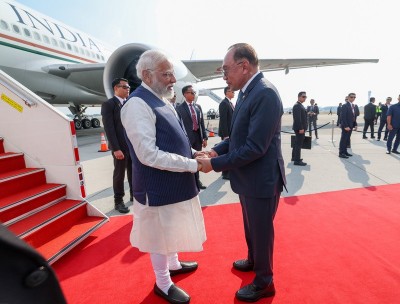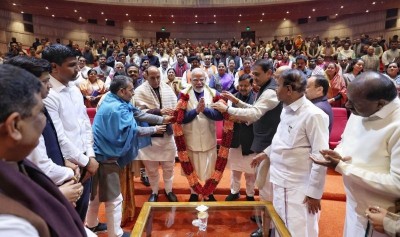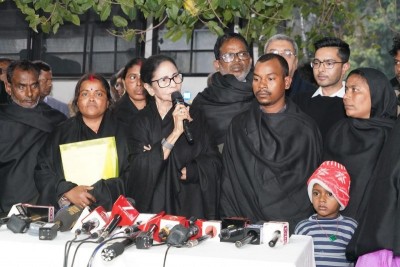
Khyber Pakhtunkhwa: Perishable Peace
On February 21, 2017, at least seven persons, including a lawyer and an eight-year-old boy, were killed and as many as 25 were injured when three terrorists wearing suicide vests attacked the Session's Court in Tangi tehsil (revenue unit) of Charsadda District. The attack started at around 11:40am when three suicide bombers opened indiscriminate fire, using automatic weapons and hurled grenades at the security officials, in an attempt to enter the Court. Policemen stationed on the premises sought to repulse their attack, gunning down two attackers, while the third blew himself up after failing to enter the building. Charsadda Assistant Commissioner Inayatullah Khan disclosed that the injured included six Policemen who confronted the terrorists in a gun battle that lasted for at least 14 minutes.
Jamaat-ul-Ahrar (JuA), an offshoot of Tehreek-e-Taliban Pakistan (TTP), claimed responsibility for the attack and declared that it was a continuation of Operation Ghazi, which they had initiated against Pakistan. The group released details of two of the attackers - Abdul Basit of Mohmand Agency in the Federally Administered Tribal Areas (FATA) and Khairullah of the Kunduz Province of Afghanistan. The JuA was also responsible for the March 6, 2016, suicide attack on the Shabqadar Sessions Court in the same Charsadda District, in which 17 persons were killed and 30 sustained injuries.
On February 16, 2017, four Policemen and a passerby were killed when the Police vehicle was attacked by unidentified motorcycle borne terrorists in the Mission Mor area of Dera Ismail Khan town in KP. The victims were identified as Assistant Sub-Inspector Rehmatullah, Constable Iqbal, Constable Irshad and the civilian, Fazal. The driver of the vehicle sustained serious bullet wounds and was rushed to hospital by rescue officials, but later succumbed to his injuries.
On February 15, 2017, the driver of the civil judge's vehicle was killed when a motorcycle borne suicide bomber rammed into the vehicle in the Hayatabad area of Peshawar, the provincial capital of KP. Civil Judge Asif Jadoon and three female judges of the lower judiciary were travelling in the official car in the Phase 5 area when the attacker struck the front of the vehicle and exploded, killing the driver and injuring the four judges. A total of six persons were injured in the explosion. TTP claimed responsibility for the attack.
The latest series of attacks on law enforcement agencies and the judiciary within a span of seven days shattered the weak ray of hope for peace in the province, which appeared in 2016 after a decade of sustained violence. The South Asia Terrorism Portal (SATP) database recorded the lowest ever fatalities in a decade in KP, at 213 - including 123 civilians, 50 SFs and 40 terrorists - in 2016, in comparison to 268 such fatalities in 2015 - including 117 civilians, 76 SF personnel and 75 terrorists. While the overall fatalities recorded a 20.52 per cent decrease in 2016 in comparison to the previous year, SF and terrorist/organised crime categories had seen a 34.21 and 46.66 per cent decline, respectively. However, reversing the trend, civilian fatalities registered a small rise of 5.12 per cent. KP recorded a peak of 5,497 fatalities in 2009.
The Province had also registered declines in other parameters of violence. There were 17 major attacks (each resulting in three or more fatalities) causing 121 deaths in 2016; as against 19 major attacks accounting for 133 deaths in 2015. The most prominent attacks in 2016 occurred on January 20, when TTP terrorists stormed the Bacha Khan University in Charsadda District, killing at least 21 persons and causing injuries to another 35. The mastermind of the APS Peshawar attack, Khalifa Umar Mansoor aka Aurangzeb, of TTP's Geedar faction, claimed the attack through a post on his Facebook page.
KP recorded only three suicide attacks resulting in 21 fatalities and 53 injured through 2016, as against six such attacks recorded in 2015, resulting in 63 fatalities and 113 injured. The number of explosions and resulting fatalities stood at 32 and 70 respectively through 2016, as against 40 and 77, respectively, in 2015.
However, Peshawar, the provincial capital, recorded an increase in the number of bomb blasts, from 11 in 2015, to 13 in 2016, though the number of explosion related fatalities remain low, at 19 in 2016 as against 30 in 2015. As in 2015, Peshawar remained the worst affected District through 2016, recording 80 terrorism-related incidents, in which 58 people were killed and another 107 were injured. Violent incidents in 2016 were reported from 20 of the 26 Districts in the Province. In 2014, violent incidents were reported from 21 Districts. The number of sectarian attacks in the Province, though, increased from five in 2015 to six in 2016, the resultant fatalities decreased to eight in 2016 from 28 in 2015.
The visible decline in terrorism related incidents in the Province has been attributed to the implementation of the National Action Plan (NAP), initiated on December 24, 2014, in the aftermath of the Peshawar Army Public School attack in which 148 persons, including 135 children, were killed. More than 312,188 'suspects' have been rounded up in over 25,000 search and strike operations, and in snap checking at 110,000 places in KP during the last almost two years. According to data released by the Central Police Office, 25,145 search and strike operations were carried out in KP between December 17, 2014 and December 6, 2016. A total of 102,282 suspects were held during these operations under NAP. During the two year drive, a total of 1,503 kilograms of explosives some 46,900 weapons and 1.5 million rounds of different bore, were also seized. The official record shows that 738 terrorists were charged, while 1,146 cases of terrorism were traced during the period.
The arrest of such a huge number of alleged terrorists and recovery of enormous caches of arms and ammunition from the Province suggests that there was a surge of runaway terrorists into KP to escape Operation Zarb-e-Azb ('Sword of the Prophet', also 'sharp and cutting') in FATA. The wrath of these fleeing terrorists fell upon KP Police, the first line of defence in the Province. On August 4, 2016, Chief Minister Parvez Khattak disclosed that as many as 1,587 Policemen had lost their lives in suicide attacks, bomb blasts, ambushes, encounters, rocket and mortar barrages and other incidents, since 1970. Over 80 per cent of these fatalities were among the constabulary. During the past almost 46 years, one Additional Inspector General (Safwat Ghayur); two Deputy Inspectors General (Malik Mohammad Saad and Abid Ali); seven Superintendents of Police (SPs); one Assistant Superintendent of Police (ASP); 24 Deputy Superintendents of Police (DSP); as well as 25 Inspectors, 115 Sub Inspectors (SI), 131 Assistant Sub Inspectors (ASI), 148 head constables and 1,133 constables, were killed in the Province.
Casualties recorded a sudden increase after 2006, when terrorists spilled over to the settled Districts from FATA. According to official Police statistics released on July 28, 2016, as many as 1,204 Policemen have been killed in attacks in KP since 2006 - 28 in 2006; 107 in 2007; 176 in 2008; 207 in 2009; 101 in 2010; 148 in 2011; 94 in 2012; 133 in 2013; 108 in 2014; 60 in 2015, and 42 in 2016 (till July 20, 2016). Peshawar tops the list among the 25 Districts of the Province, with over 340 Police fatalities, followed by Swat where 123 Police officials have died. In Bannu, 120 personnel have lost their lives, while 100 have died in Dera Ismail Khan. According to SATP, at least 17 Policemen have already been killed since July 21, 2016 - 13 in 2016 (between July 21 and December 31) and four in 2017 (till February 26).
Meanwhile, KP Police faces an acute shortage of officers, which has direct bearing on the fight against terrorism. According to an official statement issued in Peshawar on August 11, 2016, the Provincial Police had approached the Home and Tribal Affairs Department, KP, to meet the shortage so they could maintain the operational capability of units established to curb terrorism. The Province needs five Additional Inspectors General, where only two are available at present. In the rank of Deputy Inspector General (DIG), only eight officers are presently working against 18 sanctioned posts. Similarly, against 35 sanctioned posts of SSPs, only 17 are presently available, and there are 57 SPs currently available against 78 sanctioned posts.
While fragmented terrorist groups are now coming together to disrupt the brief period of relative calm in the region, the KP Government's 'soft corner' towards Taliban continues to create violent contradictions. On June 19, 2016, for instance, the KP Government allocated PKR 300 million in its budget to Darul Uloom Haqqania (Nowshera), known as the 'University of Jihad'. The madrassa is known for having several top Afghan Taliban leaders among its alumni, including former Taliban chief Mullah Omar who received an honorary doctorate from the seminary. Haqqani Network founder Jalaluddin Haqqani, al Qaeda in the Indian Subcontinent (AQIS) leader Asim Umar and slain Afghan Taliban chief Mullah Akhtar Mansoor, are among the other alumni of the seminary.
The Imran Khan-led Pakistan Tehreek-e-Insaf (PTI) Government in the Province has been allocating money to these Taliban-producing institutions, even while Imran Khan continues to blame the Federal Government for improper NAP implementation as the cause of terror attacks. The duplicity of the Provincial Government in dealing with terrorism will not allow an enduring peace to prevail.
Support Our Journalism
We cannot do without you.. your contribution supports unbiased journalism
IBNS is not driven by any ism- not wokeism, not racism, not skewed secularism, not hyper right-wing or left liberal ideals, nor by any hardline religious beliefs or hyper nationalism. We want to serve you good old objective news, as they are. We do not judge or preach. We let people decide for themselves. We only try to present factual and well-sourced news.







